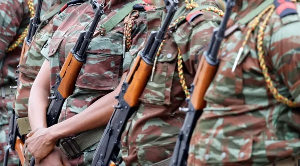RE: WHO IS BENEFITING FROM CONFLICTS IN THE NORTH?
I find an editorial of ‘The Statesman’ newspaper I read rather mischievous and hypocritical and wish to react to it through your most esteemed newspaper. In the said editorial which was posted on ‘myjoyonline’ last Friday, 22nd May 2009, the paper alleged that prior to the 2008 elections there was rumour that one of the factions in the dagbong conflict, apparently referring to the Andani faction, intended to ‘settle scores’ with the other faction if the National Democratic Congress (NDC) won the election.
The paper saw the renovation of the katini last week under security protection as “setting the stage for that bloody exercise to take off”. In its conclusion the paper sought to portray the NDC as a party that is “deliberately fanning conflicts, especially up north, in order to keep a fanatical flame burning and get the voters to cast their votes” in its favour.
It is obvious that ‘The Statesman’ is trying to smear the NDC with the mess that the NPP left in dagbong after its eight year rule. While I agree with ‘The Statesman’ that the factions in the dagbong conflict should be encouraged and motivated to unite and not remain divided, I do not share their view that NDC is fanning the conflict.
The Andani faction has every reason to rely on the NDC to seek justice for the killers of the Ya na since the NPP denied them same. It took NPP Abudu politicians one year to re-orchestrate and successfully execute what they failed to achieve in 1969, and seven years for their party to protect the perpetrators from the due course of the law. If one of the factions has said they will settle scores, that is only because they believe there are scores to settle, and that with the NPP gone they will find a sight for their sore eyes from the NDC which believes in probity and accountability.
Before the year 2000 election, word was abroad that the Ya na would be murdered if the NPP won power. Rawlings said it on several fora but he was dismissed as an alarmist. Out of many coincidences, including armoured cars battery failing and disconnected telephone network to Yendi, plus the then Minister of Interior and MP for Yendi, Malik Alhassan being unaware for three days that the Ya na was under attack, dagbong was overturned. Did Malik not fiddle while ‘Rome’ burnt, and the NPP government too?
Is it not surprising that ‘The Statesman’ is now realising that the picture is gloomy? In point of fact, the picture has ever been gloomy for some of us, even on 27th March 2002 when Na Yakubu II was assassinated, even on Sunday, 7th December 2008 when we voted. NPP had seven years to ‘detoxify the political atmosphere’ but they chose to wait and blame others for not detoxifying it. Perhaps it is out of desperation that the paper struggled to implicate the NDC in the Nanumba-Konkomba conflict that took place fifteen years ago. But the idea just doesn’t click because the paper failed to tell us which tribe the NDC supported and what is more, the NDC appointee the paper mentioned was neither a nanumba nor a konkomba. At any rate the NDC enjoy the good will and support of both tribes and the tribes cannot now be drawn into the cheap tribal ‘politricks’ of self-serving politicians.
Let ‘The Statesman’ be reminded that conflicts will always happen and sitting governments will always be blamed to have taken sides. The accusation may be true or it may not be true. I am not sure of the role the NPP government played in the Anlo or Ga chieftaincy disputes, or in the Bawku or the Bunkurugu disturbances some of which its flag bearer had to deny his involvement in. But by far, the one conflict it has become obvious to all Ghanaians that the NPP government fanned for votes, and had actually got its hands stained with blood was the dagbong chieftaincy conflict.
If former president Rawlings and others have made effusions that have not pleased the statesman who have suddenly become wary of the implication of such effusion to peace in the area, what did they say to Elizabeth Ohene who chided the chief of Tamale for daring to speak out on the Ya na’s death after the NPP government caused it to be announced on radio.
Editorials on such sensitive issues like the dagbong crises must be fair and devoid of political bias and ‘The Statesman’ ought to know this. Does the paper honestly believe that the government should and that it would, sit back and allow the katini which houses the remains of the late chief fall into ruins because some people in opposition who supervised his murder anyway, want it to collapse? Does ‘The Statesman’ really believe that the NDC’s calls for justice on those who displayed the limbs of the Ya na in broad day light and are still walking free men after seven years because Nana Akufo Addo preferred the wrong charges against them, is political and that the NPP’s silence was not? Has the paper taken the pain to find out what has stalled the road map, which faction stalled it, and which party was in power when it was stalled?
It took the NPP seven years to do nothing. Let ‘The Statesman’ shut up and allow the NDC do what the NPP swept under the carpet for seven years-justice. Lest ‘The Statesman’ did not hear the good counsel: “We must repent in this generation not only for the vitriolic words of the bad people but also for the appalling silence of the good”.
Abdulai A. Alhassan
Box 12
Bimbilla
Opinions of Friday, 29 May 2009
Columnist: Alhassan, Abdulai A.














